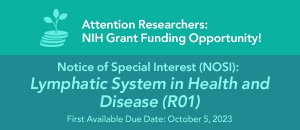Grants & Awards Programs

-
 2025 Alfie Milne Young Investigator Award
2025 Alfie Milne Young Investigator Award
Lymphatic Malformation Institute (LMI), a non-profit organization that funds research on complex lymphatic anomalies, is announcing the 2025 Alfie Milne Young Investigator Award.
Funding Level
Maximum of $25,000 may be requested for up to 1 year of support.Description
The Alfie Milne Young Investigator Award supports early career researchers, such as postdoctoral and clinical fellows or instructors, pursuing promising research ideas related to complex lymphatic anomalies including Gorham Stout Disease (GSD), Generalized Lymphatic Anomaly (GLA), Kaposiform Lymphangiomatosis (KLA) and Central Conducting Lymphatic Anomaly (CCLA). This grant aims to cultivate the best and brightest researchers of the future who demonstrate a commitment to a career in lymphatic research. This is a mentored award, and the research project is conducted under the guidance of a scientific mentor. U.S. and international researchers with a focus on complex lymphatic anomalies can apply.Eligibility Criteria
This RFA is open globally. International applicants are invited to apply. Graduate and medical students actively doing research are eligible for the award. Additionally, individuals with a PhD, MD, or MD/PhD who do not have an appointment higher than Instructor are eligible to apply.How to Apply
The completed one-page LOI is to be emailed to grants@lmiresearch.org and due no later than Friday, May 30, 2025 by 11:59pm (EST). Full applications are by invitation only and due Friday, August 29, 2025 no later than 11:59pm (EST) and emailed to grants@lmiresearch.org.Please visit https://www.lmiresearch.org/alfie-milne-young-investigator-award/ to download grant application forms and instructions.
Questions
Learn More >
Contact Mike Dellinger at mdellinger@lmiresearch.org or michael.dellinger@utsouthwestern.edu if you have any questions. -
 2025 LMI Pilot Award
2025 LMI Pilot Award
Lymphatic Malformation Institute (LMI; https://www.lmiresearch.org) a non-profit organization that funds research on CCLA, GLA, GSD, and KLA, is announcing it’s 2025 Pilot Award.
PILOT AWARD
Funding level: Maximum of $75,000 may be requested
Period: Up to 1 year of support is available
Description: Pilot awards are intended to test new hypotheses or technologies that have the potential to significantly advance our understanding or treatment of CCLA, GLA, GSD, or KLA. Preliminary data are required.Areas of interest include, but are not limited to, genetic analysis, biomarker identification, preclinical model development and characterization, imaging, and single-cell RNA sequencing of animal or patient samples.
How to apply: Submit a letter of intent (LOI) to the LMI. If your LOI is selected, you will be invited to submit a full grant application.
LOIs for Pilot Awards are due by March 21, 2025. LOIs should be submitted to grants@lmiresearch.org by 11:59 PM CST.
Invitations for full applications will be sent by March 26, 2025. Full applications are due May 30, 2025.Please visit https://www.lmiresearch.org/apply-for-funding/ to download grant application forms and instructions
Feel free to contact Mike Dellinger at mdellinger@lmiresearch.org or michael.dellinger@utsouthwestern.edu if you have any questions.
Learn More > -
 Arpa-H Glide
Arpa-H Glide
The Groundbreaking Lymphatic Interventions and Drug Exploration program, or GLIDE, envisions a future where doctors have a wide variety of therapeutic tools targeting abnormal lymphatic structure and function. Such treatments could prevent and cure primary lymphatic disease and other chronic disorders associated with lymphatic dysfunction, like autoimmune disorders and cancers. GLIDE aims to advance lymphatic medicine, improve our understanding of the role of lymphatic dysfunction in disease, and build effective, affordable, and accessible treatment options.
Learn More > -
 Patient-Centered Outcomes Research Institute
Patient-Centered Outcomes Research Institute
About PCORI
PCORI is the leading funder of patient-centered comparative clinical effectiveness research in the United States.
The Patient-Centered Outcomes Research Institute (PCORI) is an independent, nonprofit research funding organization that seeks to empower patients and others with actionable information about their health and healthcare choices.What We Do
We fund patient-centered comparative clinical effectiveness research (CER) and research-related awards, issuing funding opportunity announcements several times each year.
Learn More > -
 Notice of Special Interest (NOSI): Lymphatic System in Health and Disease (R01)
Notice of Special Interest (NOSI): Lymphatic System in Health and Disease (R01)
This notice (#NOT-HL-23-099) was issued by National Heart, Lung, and Blood Institute (NHLBI), National Institute of Arthritis and Musculoskeletal and Skin Diseases (NIAMS), National Institute of Dental and Craniofacial Research (NIDCR), and National Center for Complementary and Integrative Health (NCCIH).
This NOSI aims to promote research on the normal biology of the lymphatic system (LS) and ascertain factors that account for individual differences in the LS impacting resilience. Also of interest is research to identify factors that account for individual differences in pathobiology and response to treatments, and understand the mechanisms and potential novel therapeutics for lymphatic diseases (LDs) and secondary heart, lung, blood, and sleep (HLBS) disorders related to lymphatic dysfunction. Further, this notice intends to stimulate lymphatic research at molecular, cellular, tissue, organ, and whole-body levels, and aims to facilitate research on innovations for identifying and intervening in LDs across the lifespan and disease states. The NOSI may also reach a broader community and facilitate multidisciplinary research needed to determine the function and role LS in health, disease prevention, and to identify biomarkers and test prevention and treatment strategies with specific attention to social determinants of health, and both treatment and health inequities.
This notice applies to due dates on or after October 5, 2023, and subsequent receipt dates through September 7, 2026. This NOSI expires on September 8, 2026; thus no applications will be accepted on or after September 8, 2026.
For more information, click here.
Learn More > -
 Congressionally Directed Medical Research Programs (CDMRP)
Congressionally Directed Medical Research Programs (CDMRP)The CDMRP originated in 1992 via a Congressional appropriation to foster novel approaches to biomedical research in response to the expressed needs of its stakeholders-the American public, the military, and Congress.
Hallmarks of the CDMRP include:
- investing in groundbreaking research
- targeting critical gaps
- reviewing application using a two-tier formal review with no standing peer review panels and no “pay line”
- involving consumer advocates throughout the program cycle
- supporting both the next generation of researchers and established scientists.
- funding the full pipeline of research development, including basic, translational, and clinical research.
- fostering (or employing) collaboration and synergyThe CDMRP fills research gaps by funding high impact, high risk and high gain projects that other agencies may not venture to fund. While individual programs are unique in their focus, all of the programs managed by the CDMRP share the common goal of advancing paradigm shifting research, solutions that will lead to cures or improvements in patient care, or breakthrough technologies and resources for clinical benefit. The CDMRP strives to transform health care for Service Members and the American public through innovative and impactful research.
Congressionally Directed Medical Research Programs
PRMRP Summary Sheet_26July24.pdf
Peer Reviewed Medical, Congressionally Directed Medical Research Programs
-
 Lymphatic researchers needed for NIH Study Sections
Lymphatic researchers needed for NIH Study SectionsLE&RN was asked to recruit and has registered through the CSR portal in order to recommend potential reviewers. They have identified the following three Study Sections that review lymphatic grant proposals:
* Hypertension and Microcirculation (HM) Study Section reviews applications dealing with propulsion of lymph, lymphatic tone, and pathogenesis of lymphedema with more focus on functional studies; sometimes reviews applications about the lymphatic system in infection and inflammation depending on the outcome of research, namely whether focused on lymphatics or infection.
* Immunity and Host Defense (IHD) and Innate Immunity and Inflammation (III) Study Sections may review applications that address lymphatic role in infection.
* Cardiovascular Differentiation and Development (CDD) Study Section reviews applications involving lymphatic development, lymphangiogenesis, and lymphedema focusing on structure.If you are willing to serve on one or more of the above-identified NIH Study Sections, please contact LE&RN at LERN@LymphaticNetwork.org with the following information:
* Name
* Affiliation
* Study Section(s) on which you are willing to serve
* In 50 words or less, your qualifications for each Study Section selected
* Include CVInvestigators will not be able to review their own research or research on which they are collaborators. However, this will not prevent your research from being reviewed by the Study Section. Per NIH: If a researcher is on a Study Section and has an application, his or her application is reviewed by a special emphasis panel. This is a common practice that happens all the time. This should not be an obstacle to joining a Study Section.